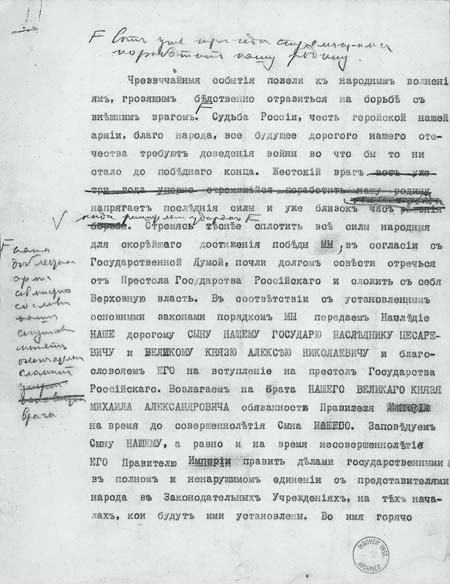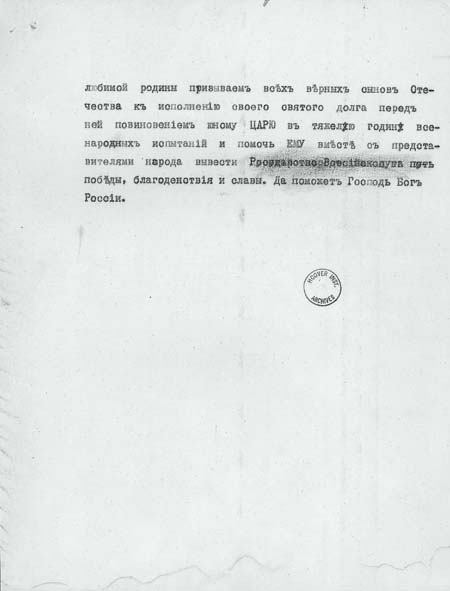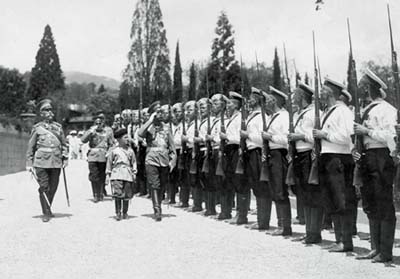- History
- Contemporary
- World
Twice in this century—in 1917 and again in 1991—a great Russian empire collapsed, not from military defeat but from internal disintegration. And in each case, the head of state, finding himself completely bereft of tangible support, stepped quietly aside, eschewing violent resistance.
On December 25, 1991, Mikhail Gorbachev, in a radio address to his nation, abdicated the presidency of a disintegrated Soviet Union. Five months later, during his visit to Stanford University, my colleagues and I had the opportunity to show President Gorbachev some of the treasures of the Hoover Institution Archives. One document in particular caught his attention. As we discussed that document, I detected a reflective, understanding smile creep over his face. It was as if here, in the unlikely California oasis of Stanford University, he suddenly had encountered the ghost of the only other person in the tragic history of his country who had experienced a similar humiliating fate. That document was the abdication manifesto of Tsar Nicholas II.
  Click on images to see larger version |
The Hoover Institution Archives holds the drafts of the tsar’s abdication manifesto as part of the papers of Nicolas de Basily. It was Basily, chief of the diplomatic chancellory at the imperial Russian military headquarters in Mogilev, who was assigned the task of preparing the document. It was a dangerous and stressful time.
In the streets of the Russian capital of Petrograd, revolutionary disorder had suddenly overwhelmed the tsar’s military forces, nearly all of whom were fighting the Central Powers on the eastern front. Revolutionary agitators were undermining the loyalty of the soldiers. And the Russian Duma—the previously powerless parliament that had now become a center of revolutionary activity—was demanding the tsar’s abdication. Strongly motivated by his oath to God and country, however, Nicholas stubbornly resisted these demands. Only after his generals begged him to step aside, out of fear of the collapse and defeat of his armies, did he relent.
 Tsar Nicholas II and his son and heir, Alexei, inspect members of the Russian navy, circa 1916. The tsar would abdicate one year later; Nicholas and his family were killed by the Bolsheviks in July 1918. Hoover Institution Archives. Tsar Nicholas II and his son and heir, Alexei, inspect members of the Russian navy, circa 1916. The tsar would abdicate one year later; Nicholas and his family were killed by the Bolsheviks in July 1918. Hoover Institution Archives. |
As required by Russian law, Basily’s drafts of the manifesto named Nicholas’s young hemophiliac son, Alexei, as the new tsar. When told that he might have to leave his son behind in Russia and live in exile, however, Nicholas changed the draft. Instead of Alexei, he named his ineffectual younger brother, Grand Duke Michael, as his successor. If the Romanov dynasty had had any chance at all of surviving the crisis, this decision irretrievably spelled its doom. Although the Duma conceivably might have accepted the attractive and innocent young son, it was in no mood to accept Michael. When Duma leaders told Michael that his safety could not be ensured, the newly designated tsar quickly renounced the throne.
Nicholas’s abdication and Michael’s renunciation were made public simultaneously on March 4, two days after Nicholas signed the abdication manifesto. The manifesto was addressed to the chief of staff of the armed forces, General Mikhail V. Alekseev, because Nicholas did not wish to abdicate to the Duma, which he detested. Although he signed the document at 11:50 p.m. on March 2, he backdated it to 3:05 p.m.—to avoid the impression that he had been influenced by a delegation from the Duma with whom he had met that evening. The town of Pskov is recorded as the place where the manifesto was signed. The event actually took place aboard the imperial train, which had been diverted to Pskov when rebels blocked its way to Tsarskoe Selo, where Nicholas hoped to rejoin his family.
In the sixth and final version of the abdication manifesto, Nicholas II passed the reins of power to his brother, Grand Duke Michael.
|
Headquarters In the days of the great struggle against the external enemy, who has striven for nearly three years to enslave our homeland, the Lord God has willed to subject Russia to yet another heavy trial. The popular disturbances that have broken out threaten to have a calamitous effect on the further conduct of the hard-fought war. The fate of Russia, the honor of our heroic army, the welfare of the people, the whole future of our beloved Fatherland demand that the war be brought at all costs to a victorious conclusion. The cruel foe exerts his last efforts, and the time is near when our valiant army, together with our glorious allies, will decisively overcome him. In these decisive days in Russia’s life We have deemed it Our duty in conscience to Our nation to draw closer together and to unite all the national forces for the speediest attainment of victory. In agreement with the State Duma, We have acknowledged it as beneficial to renounce the throne of the Russian State and lay down Supreme authority. Not wishing to separate Ourselves from Our beloved Son, We hand over Our succession to Our Brother, the Grand Duke Michael Aleksandrovich, and give Him Our blessing to ascend the throne of the Russian State. We command Our Brother to conduct the affairs of state in complete and inviolate union with the representatives of the nation in the legislative institutions on such principles as they will establish and to swear to this an inviolate oath. In the name of Our deeply beloved homeland, We call on all true sons of the Fatherland to fulfill their sacred duty to It by obeying the Tsar in the difficult moment of national trials and to help Him, together with the representatives of the people, lead the Rus-sian State to victory, prosperity, and glory. May the Lord God help Russia. Pskov, 2 March 1917 |
What is perhaps most remarkable about the abdication of Nicholas II and the collapse of his empire is the suddenness with which these events occurred. Only days before the manifesto was signed, Duma leaders sought nothing more than the dismissal of the tsar’s ministers and the appointment of replacements responsible to the legislature. Suddenly, however, not only had the tsar been called upon to abdicate, but the Romanov dynasty itself had come to an end and a constituent assembly authorized to establish an entirely new form of government. The empire also quickly dissolved, as provinces that had been linked to Russia by the person of the tsar one by one declared their independence.
As a contemporary observer, Vasili Rozanov, noted,
Russia wilted in two days. At the very most, three. . . . It is amazing how she suddenly fell apart, all of her, down to particles, to pieces. . . . There was no Empire, no church, no army, no working class. And what remained? Strange to say, literally nothing.
The four months between August 19, 1991, when a coup attempted to depose President Gorbachev, and December 25, 1991, when he resigned his office, are reminiscent of the events of early March 1917. What had appeared to be great and secure empires were in both cases revealed to be hollow shells. Lacking democratic support, both empires collapsed quickly without resistance and, thankfully, with little bloodshed. We can only hope that the long-term aftermath of the events of 1991 will differ radically from those of 1917. For the tsar’s abdication was the starting point of what became a seventy-four-year tragedy for the Russian people. A similar outcome of the revolutionary changes of 1991 would be a tragedy not only for Russia but for all the world.







